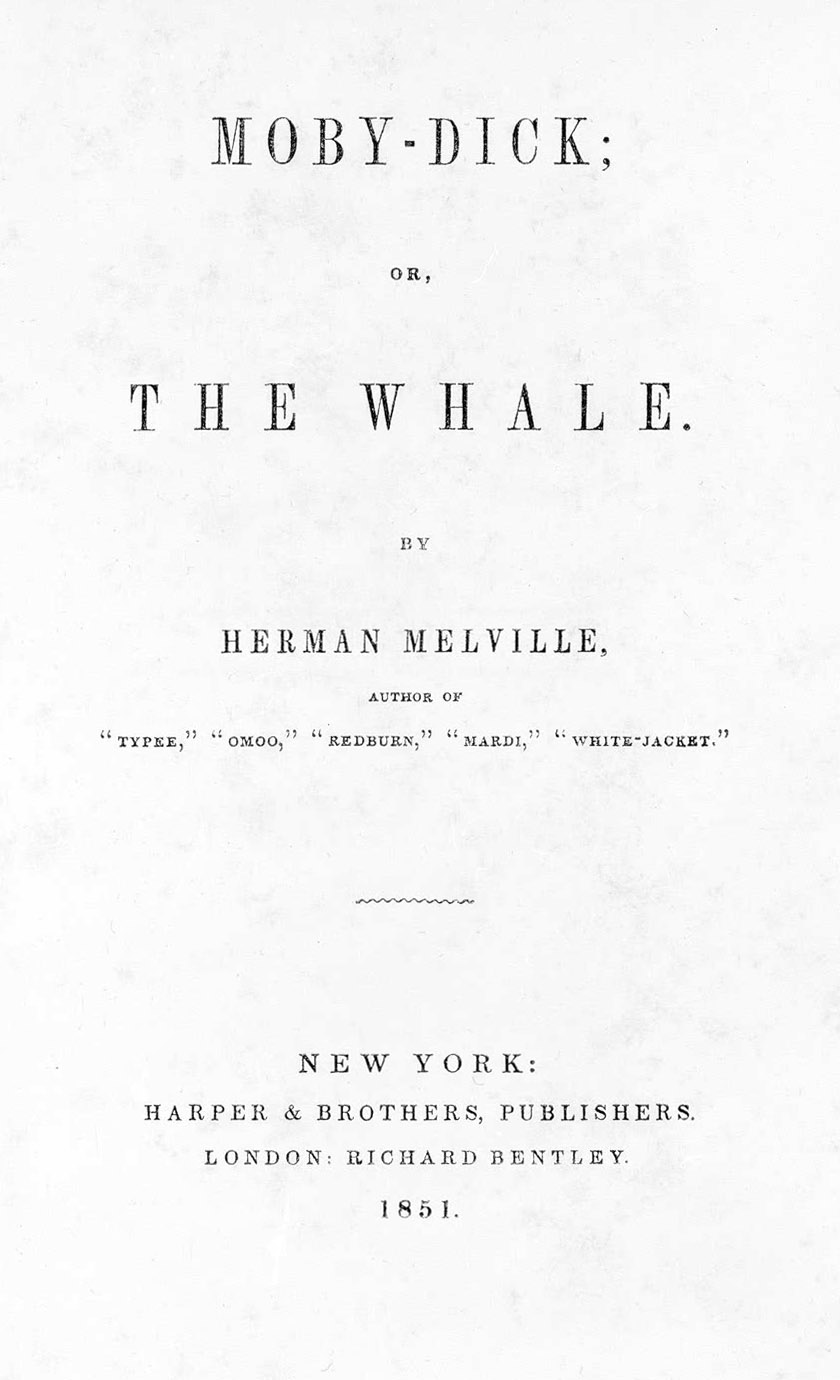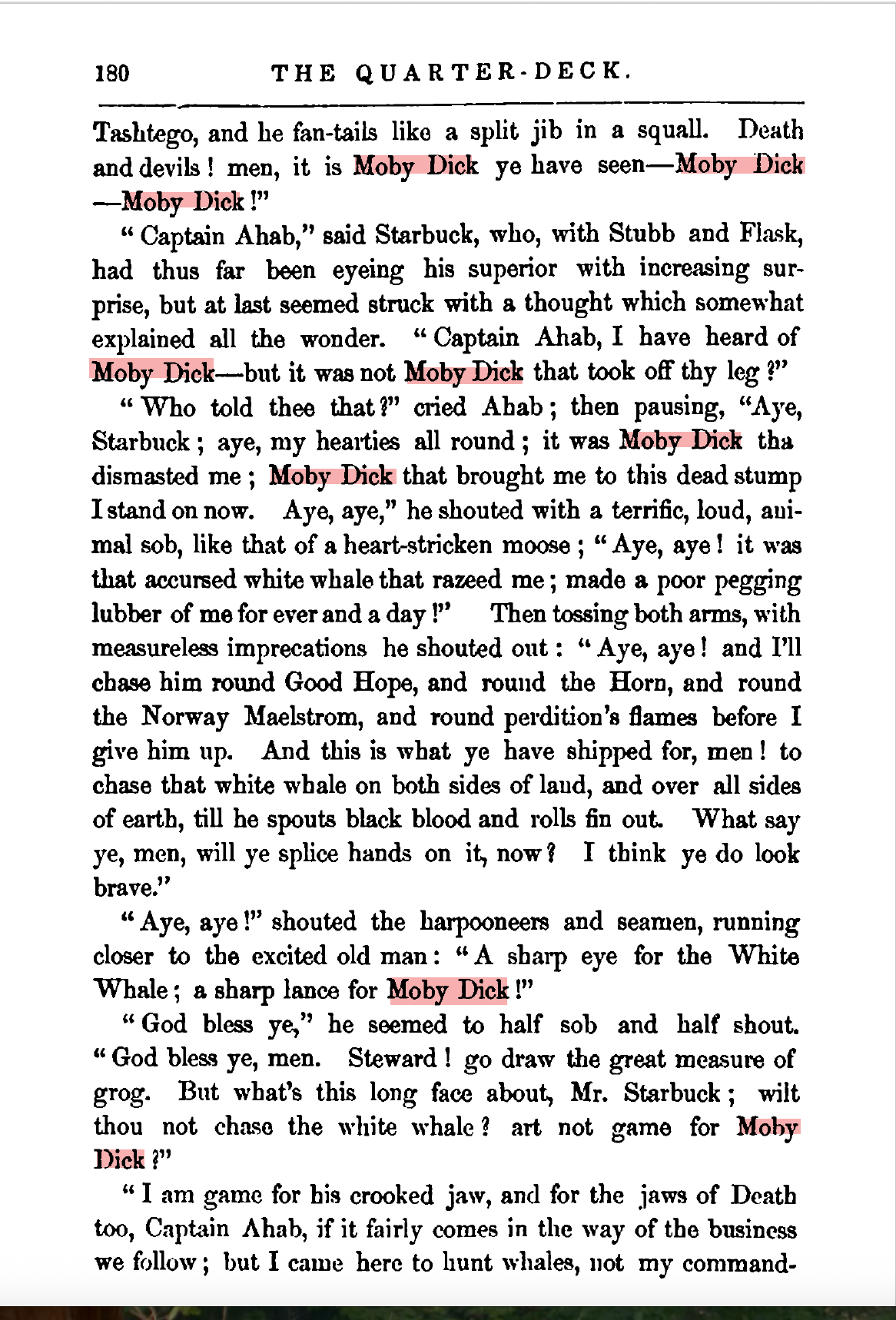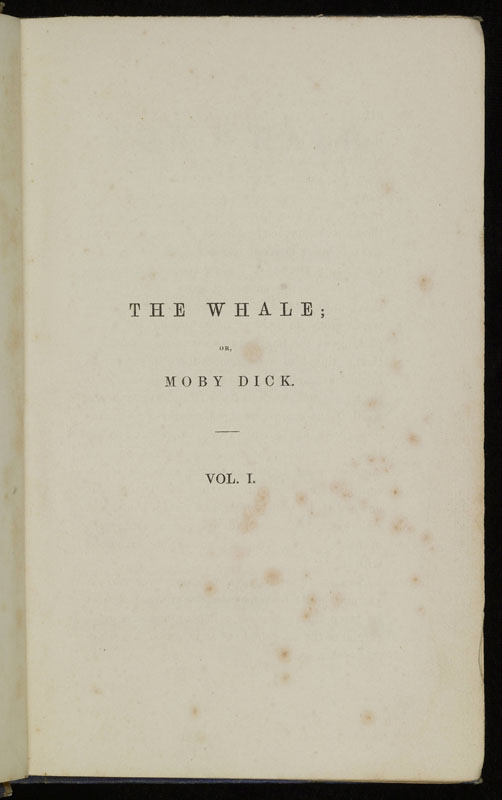Melvillian (non-)hyphenation
« previous post | next post »
Frazz 9/10/2025 — Caulfield and Mrs. Olson discuss Melville's novel:

Continued in Frazz 9/11/2025:

It's true that Moby-Dick is hyphenated in the title of the 1851 American edition:
And also true that none of the other 80-odd instances of the whale's name in that edition are hyphenated, e.g.
In the British first edition, even the title is unhyphenated:
Melville — and his editors and typesetters — were not generally anti-hyphen. The American first edition has 2403 instances of 1605 hyphenated words, starting with 67 instances of mast-head(s).
The Melville Electronic Library has side-by-side versions of the American and British first editions, with various textual observations — including this:
[I]n modern usage—both scholarly and now popularly—the hyphenated Moby-Dick designates the book; the unhyphenated “Moby Dick” represents the white whale.
Leaving the hyphen behind, there's more from Frazz, fore and aft of the two strips above — 9/8/2025:






JMGN said,
September 13, 2025 @ 6:10 pm
A perfect morning to not read ‘Moby Dick’—New Yorker, 1986.
Mark Liberman said,
September 14, 2025 @ 6:51 am
@JMGN:
That New Yorker quotation is known because Fowler’s Dictionary of Modern English Usage (the current edition at least) cites it in the "split infinitive" article, in the the "Unproblematic split infinitives" section.
The source is an article by Tony Gibbs in the September 8 1986 issue of the magazine about circumnavigating Long Island by boat. A bit more context:
Fowler's conclusion (in this edition) is
The prejudice against the split infinitive, though relatively recent in the broader context of the history of English, has a considerable weight of opinion behind it. The split infinitive is, therefore, best avoided, especially when it is stylistically awkward. But it is not a major error nor a grammatical blunder; it is acceptable, even necessary, when considerations of rhythm and clarity require it.
The "Split Infinitives" entry in the 1926 edition is here.
For some background, see "Books more loved than looked in" (4/30/2008) and "Crazies win" (5/13/2008).
Stephen Goranson said,
September 14, 2025 @ 5:47 pm
In the 19th century hyphenations sometimes included
United-States and New-York.
Mark Liberman said,
September 14, 2025 @ 6:46 pm
@Stephen Goranson:
See "Rebranding" (7/25/2023), which includes several clips from the New-York Times…
ajay said,
September 15, 2025 @ 5:48 am
"In the 19th century hyphenations sometimes included United-States and New-York."
And street names generally, at least in UK sources. Not Regent Street, but Regent-street.
Andreas Johansson said,
September 15, 2025 @ 6:03 am
In my native Swedish, street names are usually written as single worlds, e.g. Drottninggatan "Queen Street". This gets awkward when the first part has a space in it, e.g., Birger Jarlsgatan, which segments as (((Birger Jarl)s)gatan). Birger is a PN and jarl an old title cognate with "earl".
(The connecting -s- is originally the genitive ending, but synchronically a semantically empty connective element required in some compounds according to complex and not entirely consistent rules.)
KevinM said,
September 15, 2025 @ 10:56 am
"or, The Whale" is the name of a restaurant on Nantucket. https://www.otwnantucket.com/
Philip Anderson said,
September 15, 2025 @ 1:02 pm
News headlines are never written by the author of the article, and it often seems that the sub-editor responsible hasn’t read the article, or only enough to identify the topic*; maybe the person who laid out this title page hadn’t read the book, just been told the title verbally?
*My favourite example is from The Times in and on 1984, where the headline was “Are we helping to fulfil George Orwell’s prophecies?” and the first sentence was “1984 is satire not prophecy.”
Robert Riddett said,
September 15, 2025 @ 4:53 pm
Hyphenation of street names in England died out in the 1960s, and was always limited to newspapers. Novels published in the 1930s have no such hyphenation. Newspaper hyphenation was odd: a three-word street name was usually hyphenated only between the second and third words, and not between the first and second word, so we would have "King James-Street".
Jonathan Smith said,
September 15, 2025 @ 7:08 pm
With or without hyphen, hard to understand what a title of the form "X; or Y" means… call it either or file it under either as the mood strikes you? Cf. song titles with parenthesis — (I Can't Get No) Satisfaction, etc. — cumbersome academic article titles of the form "long string colon long string" — example hardly needed — etc.
Though in the case of Moby Dick, apparently Melville just liked the sound of the title of one J. N. Reynolds' (factual?) account "Mocha Dick: Or the White Whale of the Pacific" (variously punctuated online)…
Philip Taylor said,
September 16, 2025 @ 3:50 am
Unlike Jonathan, I rather like old-fashioned titles such as Farrar’s Eric, or Little by Little, and am a little sad that they have gone out of vogue. Had the book just been called "Eric", I doubt I would ever have bothered reading it, but the combination just drew me in, suggesting (as it does) that Eric will make steady progress in something unspecified over the course of the book.
Philip Taylor said,
September 16, 2025 @ 3:54 am
Robert — was there any connection, do you know, between the abandonment of hyphens in English street names and the abandonment of the definite article therein ? I ask because I always knew a particular road near Maldon (Essex) as The Mundon Road, but I believe that the article has now been abandoned and it is known simply as "Mundon Road".
Bob Ladd said,
September 16, 2025 @ 7:33 am
Hyphenation in street names is often found in German in exactly the "awkward" circumstances mentioned above by Andreas Johansson for Swedish. If a street name just includes a surname (e.g. Adenauerstraße or Mahlerweg) it's written with no space or hyphen, but if it includes a given name as well (e.g. Konrad-Adenauer-Straße or Gustav-Mahler-Weg) it's often (though not always) written with hyphens at all word boundaries, including between the given name and the surname.
ajay said,
September 16, 2025 @ 8:38 am
"was there any connection, do you know, between the abandonment of hyphens in English street names and the abandonment of the definite article therein ? "
This has almost but not quite died out in London. I've heard people talking about "the Edgware Road". But it used to be much more common – "I've seen their carriages blocking the half of the Cromwell Road" wrote Kipling in "The Mary Gloster". And note that it wasn't just for roads that are named after the places they lead to. Calling the road to Glasgow, whatever its official name, "the Glasgow road" is still perfectly normal.
And Edgware Road does lead to Edgware; but Cromwell Road does not lead to somewhere called Cromwell.
ajay said,
September 16, 2025 @ 8:48 am
Hyphenation of street names in England died out in the 1960s, and was always limited to newspapers. Novels published in the 1930s have no such hyphenation.
Very interesting – I had no idea it had gone on so late.
But I don't think it is correct to say that hyphenation of street names was always limited to newspapers. Ch.20 of "Sense and Sensibility":
“Upon my honour I did.—I met Colonel Brandon Monday morning in Bond-street, just before we left town, and he told me of it directly.”
And ch. 12 of "Tom Jones": “Ay, ay,” says the ensign, “and so she is: d—n me, it is the same woman; and I'll hold half a dozen of Burgundy, Tom French of our regiment brings her into company with us at any tavern in Bridges-street.”
But Thackeray doesn't use it in "Vanity Fair" and neither does Defoe in "Moll Flanders".
Roscoe said,
September 16, 2025 @ 12:49 pm
Re: “X; or, Y” titles: I always liked The Goon Show’s “Around the World in Eighty Days; or, Money Refunded.”